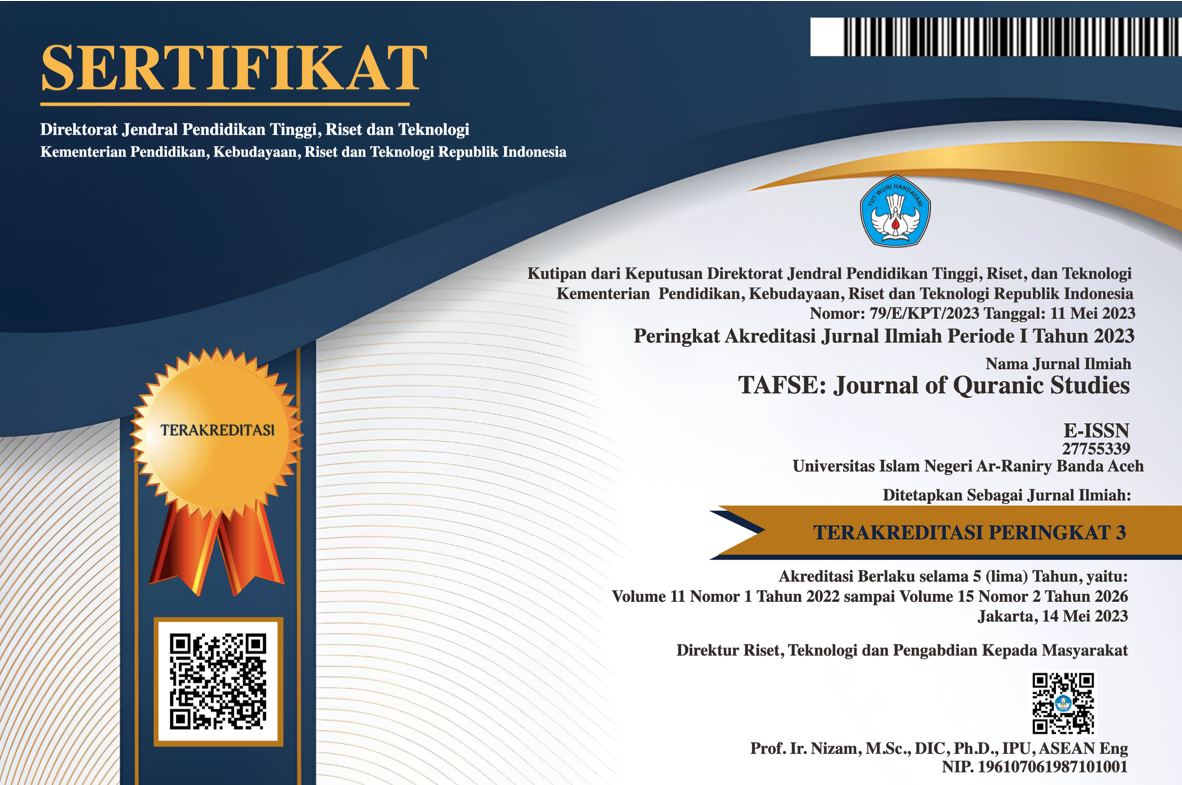Israf and Tabzir in Tafsir Al-Misbah: The Understanding of Pidie Jaya Community Leaders and Its Implications for Consumption in Aceh
DOI:
https://doi.org/10.22373/tafse.v9i2.28851Keywords:
Israf, Tabzir, Consumption, Quraish Shihab, Tafsir Al-Misbah, AcehAbstract
Modernization has shifted Acehnese society from simplicity to consumerism. In Islam, excessive consumption is classified as israf (overspending on permissible matters) and tabzir (wasting wealth on non-beneficial purposes). Quraish Shihab’s Tafsir Al-Misbah highlights their role in social inequality and spiritual degradation. This study employs a qualitative descriptive-interpretative approach, utilizing library research and semi-structured interviews with three community leaders in Pidie Jaya. Data were analyzed thematically and interpretatively, comparing respondents’ views with Tafsir Al-Misbah. The findings indicate that the respondents’ understanding aligns with Quraish Shihab’s exegesis, although they place greater emphasis on economic aspects over spiritual dimensions. This awareness helps prevent a status-driven consumer culture in Aceh, confirming that balanced consumption is integral to the principle of hifzul mal (preserving wealth) in Islam. However, strong social norms promote excessive spending, necessitating educational strategies through religious institutions, formal education, and social media to cultivate ethical consumption habits in line with Islamic values.
Downloads
References
Abdurrahman, Dudung. “Israf Dan Tabdzir: Konsepsi Etika-Religius Dalam Al Qur’an Dan Perspektif Materialisme-Konsumerisme.” Mimbar: Jurnal Sosial Dan Pembangunan 21, no. 1 (2005): 65–80.
Adi, Kurniadi, Prades Arianto Silondae, Achmad Abubakar, Halimah Basri, and Muh. Azka Fazakah Rifah. “Perilaku Hedonis Dalam Al-Qur’an Studi Atas Term Al-Israf Q.S Al-A’raf Ayat 31.” AL-MUTSLA 5, no. 2 (December 30, 2023): 425–37. https://doi.org/10.46870/jstain.v5i2.755.
Afrina, Dita. “RASIONALITAS MUSLIM TERHADAP PERILAKU ISRAF DALAM KONSUMSI PERSPEKTIF EKONOMI ISLAM.” EkBis: Jurnal Ekonomi Dan Bisnis 2, no. 1 (April 4, 2019): 23. https://doi.org/10.14421/EkBis.2018.2.1.1088.
Al-Shalchi, Zainab. “Ethical Consumption in Islam: Embracing Mindfulness & Justice • Muslim Family Hub.” Muslim Family Hub, 2023. https://muslimfamilyhub.org/general/ethical-consumption-in-islam-embracing-mindfulness-justice/?
Alifah, Umi. “Makna Tabzir Dan Israf Dalam Al_Qur’an.” UIN Sunan Kalijaga, 2016. https://digilib.uin-suka.ac.id/id/eprint/23227/.
Assaidi, Sadullah. “Outfit between Needs and Requirements of Times: Maqashidi Analysis of Al-A’raf [7]:31.” TSAQAFAH 20, no. 1 (May 26, 2024). https://doi.org/10.21111/tsaqafah.v20i1.10707.
Bahri S., Andi. “Etika Konsumsi Dalam Perspektif Ekonomi Islam.” HUNAFA: Jurnal Studia Islamika 11, no. 2 (December 2014): 347. https://doi.org/10.24239/jsi.v11i2.360.347-370.
Hamdi, Baitul. “Prinsip Dan Etika Konsumsi Islam (Tinjauan Maqashid Syariah).” Islamadina : Jurnal Pemikiran Islam 23, no. 1 (April 28, 2022): 1. https://doi.org/10.30595/islamadina.v23i1.10821.
HS, Muhammad Alwi. Tafsir Al-Mishbah: Pesan, Kesan Dan Keserasian Al-Qur’an Quraish Shihab, 2021. https://tafsiralquran.id/tafsir-al-mishbah-pesan-kesan-dan-keserasian-al-quran-quraish-shihab/.
Junaidi, Junaidi, Ready Wicaksono, and Hamka Hamka. “The Consumers’ Commitment and Materialism on Islamic Banking: The Role of Religiosity.” Journal of Islamic Marketing 13, no. 8 (June 24, 2022): 1786–1806. https://doi.org/10.1108/JIMA-12-2020-0378.
Kiani, Mehdi. “A Comparative Analysis of Concepts ‘Consumerism’, ‘Israf’ and ‘Tabzir’ in Conventional and Islamic Economics.” In The 3rd National Conference on Humanities and Islamic Studies, 2018. https://www.researchgate.net/publication/326698402_A_Comparative_Analysis_of_Concepts_Consumerism_Israf_and_Tabzir_in_Conventional_and_Islamic_Economics.
Mohamad Saleh, Mohamad Saifudin, Ali Mehellou, and Bahiyah Omar. “The Influence of Islamic Values on Sustainable Lifestyle: The Moderating Role of Opinion Leaders.” Sustainability 15, no. 11 (May 26, 2023): 8640. https://doi.org/10.3390/su15118640.
Muna, Moh. Nailul. “The Method of Qur’anic Exegesis in Indonesian Modern Context: A Study of Hamka’s and Quraish Shihab’s Thoughts on Trinity.” SUHUF 15, no. 1 (October 11, 2022): 63–81. https://doi.org/10.22548/shf.v15i1.700.
Nadhif, Ahmad Ainun. “Studi Ayat-Ayat Tentang Hedonisme Perspektif Quraish Shihab Dalam Tafsir Al-Misbah,” 2023. http://repository.iainkudus.ac.id/11506/.
Pusat Studi Al-Quran. “Profil - Muhammad Quraish Shihab Official Website,” n.d. https://quraishshihab.com/profil-mqs/.
Quraish Shihab. Tafsir Al-Misbah, Pesan, Kesan Dan Keserasian Al-Qur’an. Jakarta: Lentera Hati, 2002.
Rahmatullah, Rahmatullah, Hudriansyah Hudriansyah, and Mursalim Mursalim. “M. Quraish Shihab Dan Pengaruhnya Terhadap Dinamika Studi Tafsir Al-Qur’an Indonesia Kontemporer.” SUHUF 14, no. 1 (June 30, 2021): 127–51. https://doi.org/10.22548/shf.v14i1.618.
Rasyid, Abdul. “INTERPRETASI SURAH AL-ISRA’ AYAT 23 DAN 24 UNTUK PEMBIASAAN BIRR AL-WALIDAIN SANTRI DI PONDOK PESANTREN AL-HAYAA’ BATAM.” Studia Religia : Jurnal Pemikiran Dan Pendidikan Islam 8, no. 1 (June 12, 2024): 60–72. https://doi.org/10.30651/sr.v8i1.22481.
Rock-Singer, Aaron. “The Rise of Islamic Society: Social Change, State Power, and Historical Imagination.” Comparative Studies in Society and History 64, no. 4 (October 15, 2022): 994–1023. https://doi.org/10.1017/S0010417522000317.
Rofiqoh. “MAKNA TABDHIR DALAM AL-QUR’AN (Studi Pemikiran Quraish Shihab Dalam Kitab Tafsir Al- Misbah).” IAIN Ponorogo, 2020. https://etheses.iainponorogo.ac.id/14703/.
Rofiqoh, Imawati. “Otoritas Keagamaan Baru Dan Keislaman Indonesia: Peran Alumni Al-Azhar Di Ruang Publik.” UIN Sunan Kalijaga, 2019.
Rohmana, Yana. “Consumption: Ethical Perspective of Islamic Economics.” Review of Islamic Economics and Finance 5, no. 1 (November 17, 2022): 79–92. https://doi.org/10.17509/rief.v5i1.52164.
Rusanti, Ega, A. Alfira Yuningsih M., and Muhammad Ahsan Kamil. “The Effect of Materialism and Hedonic Shopping Toward Impulse Buying of Muslim Consumer: A Moderating Role of Religiosity.” IQTISHADIA 17, no. 1 (June 10, 2024): 57. https://doi.org/10.21043/iqtishadia.v17i1.25197.
Shovkhalov, Shamil. “Islamic Economic Principles and Their Contributions to Ecological Sustainability and Green Economy Development.” Edited by D. Nazarov, A. Juraeva, and S. Talu. E3S Web of Conferences 541 (June 18, 2024): 04009. https://doi.org/10.1051/e3sconf/202454104009.
Umiarso, Umiarso, and Syamsul Rijal. “Kristalisasi Nilai Materialisme Dalam Pembentukan Perilaku Konsumeristik Di Kalangan Masyarakat Perkotaan Banda Aceh.” Kontekstualita 34, no. 1 (2019): 60. https://e-journal.lp2m.uinjambi.ac.id/ojp/index.php/Kontekstualita/article/view/1274.
Utami, Wahyu. “Israf Dan Gaya Hidup Masyarakat Modern Perspektif Al-Qur’an : Studi Tafsir Mawdhu’i.” Universitas Islam Negeri Sunan Ampel Surabaya, 2018. https://digilib.uinsa.ac.id/26361/.
Downloads
Additional Files
Published
Issue
Section
License
Authors who publish with this journal agree to the following terms:
- Authors retain copyright and grant the journal right of first publication with the work simultaneously licensed under a Creative Commons Attribution License (CC BY NC 4.0) that allows others to share the work with an acknowledgment of the work's authorship and initial publication in this journal.
- Authors are able to enter into separate, additional contractual arrangements for the non-exclusive distribution of the journal's published version of the work (e.g., post it to an institutional repository or publish it in a book), with an acknowledgment of its initial publication in this journal.
- Authors are permitted and encouraged to post their work online (e.g., in institutional repositories or on their website) prior to and during the submission process, as it can lead to productive exchanges, as well as earlier and greater citation of published work (See The Effect of Open Access).





